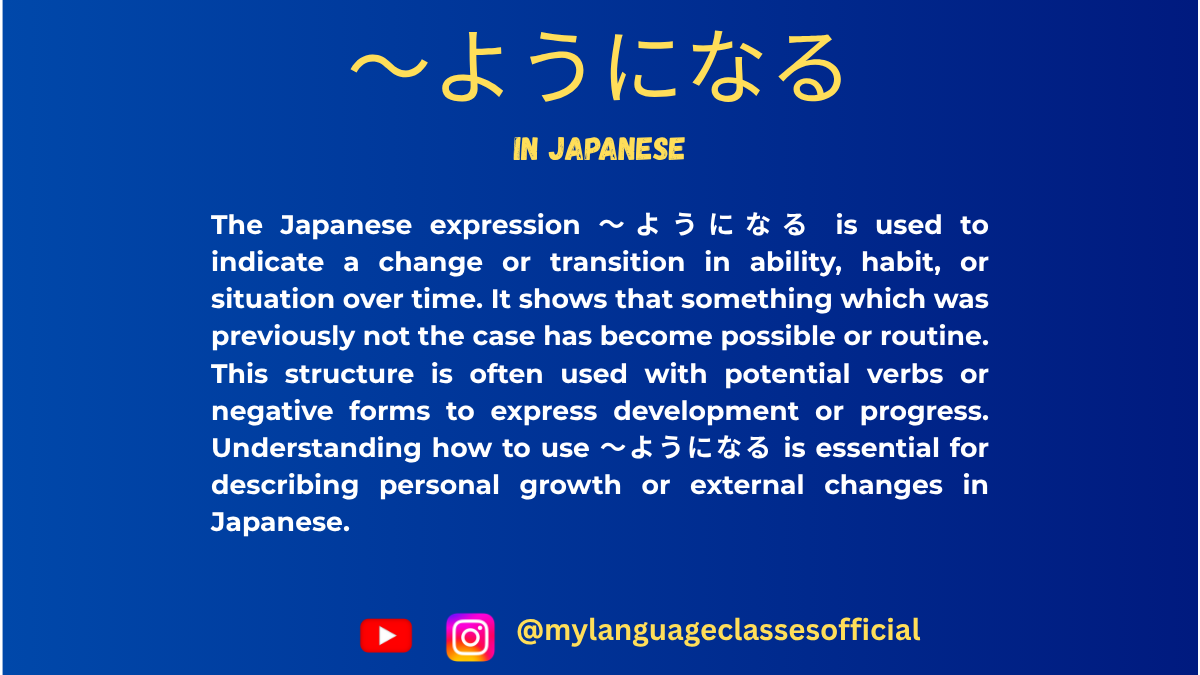Your cart is currently empty!
Tag: mastering ようになる
-

Expressing a Change in Ability or Habit: 〜ようになる | My Language Classes
Using 〜ようになる
The phrase 〜ようになる is an essential part of Japanese grammar, used to express a change in state, habit, or ability. It highlights the process of becoming able to do something, beginning to develop a habit, or shifting circumstances over time. Let’s dive into its nuances, usage, and variations.
Basic Structure
- Verb Dictionary Form + ようになる
- Used to indicate a change in ability or habit.
- Example:
- 日本語が話せるようになる。
(Nihongo ga hanaseru you ni naru.)
“I’ve become able to speak Japanese.”
- 日本語が話せるようになる。
- Verb Negative Form (〜ない) + ようになる
- Indicates a change where something that used to occur does not happen anymore.
- Example:
- 甘いものを食べないようになる。
(Amai mono o tabenai you ni naru.)
“I’ve stopped eating sweets.”
- 甘いものを食べないようになる。
Situations Where 〜ようになる Is Used
1. Expressing a Change in Ability
Usage: When describing the development of a new skill or ability.
- Example:
- ピアノが弾けるようになる。
(Piano ga hikeru you ni naru.)
“I’ve learned to play the piano.”
- ピアノが弾けるようになる。
- Context: This is often used to highlight personal growth or achievement after practice.
2. Expressing a Change in Habit
Usage: When describing the adoption or cessation of a habit.
- Example:
- 毎日運動するようになる。
(Mainichi undou suru you ni naru.)
“I’ve started exercising daily.” - 早く寝るようになる。
(Hayaku neru you ni naru.)
“I’ve started going to bed early.”
- 毎日運動するようになる。
3. Describing a Change in Circumstances
Usage: When external factors bring about a new state or condition.
- Example:
- このボタンを押すと、電気がつくようになります。
(Kono botan o osu to, denki ga tsuku you ni narimasu.)
“When you press this button, the light will turn on.”
- このボタンを押すと、電気がつくようになります。
- Context: Used in instructional contexts or technical explanations.
4. Cultural or Personal Shifts
Usage: Reflecting societal or personal changes.
- Example:
- 最近、日本で外国人がよく見られるようになった。
(Saikin, Nihon de gaikokujin ga yoku mirareru you ni natta.)
“Recently, foreigners have become more commonly seen in Japan.”
- 最近、日本で外国人がよく見られるようになった。
5. Subtle Emotional Changes
Usage: To highlight shifts in feelings or perspectives.
- Example:
- 一人で旅行するのが楽しいようになる。
(Hitori de ryokou suru no ga tanoshii you ni naru.)
“I’ve come to enjoy traveling alone.”
- 一人で旅行するのが楽しいようになる。
6. Children’s Development
Usage: Describing how children acquire new abilities.
- Example:
- 赤ちゃんが歩けるようになった。
(Akachan ga arukeru you ni natta.)
“The baby has learned to walk.”
- 赤ちゃんが歩けるようになった。
7. Technology and Innovations
Usage: Highlighting how innovations change daily life.
- Example:
- この機械のおかげで、簡単に料理が作れるようになった。
(Kono kikai no okage de, kantan ni ryouri ga tsukureru you ni natta.)
“Thanks to this machine, cooking has become easier.”
- この機械のおかげで、簡単に料理が作れるようになった。
Additional Points to Remember
- Focus on Gradual Change
- 〜ようになる emphasizes a process or transformation, not an instant change.
- Wrong: 一瞬で泳げるようになった。
(Isshun de oyogeru you ni natta.)
(This doesn’t fit, as the change isn’t gradual.) - Correct: 練習して、泳げるようになった。
(Renshuu shite, oyogeru you ni natta.)
“I practiced and became able to swim.”
- Used in Both Formal and Informal Speech
- Informal: 最近、本を読むようになった。
(Saikin, hon o yomu you ni natta.)
“Lately, I’ve started reading books.” - Formal: お客様は、アプリで簡単に予約できるようになりました。
(Okyakusama wa, apuri de kantan ni yoyaku dekiru you ni narimashita.)
“Customers can now easily make reservations via the app.”
- Informal: 最近、本を読むようになった。
- Expressing Negative Changes
- Example:
- 以前のように、お酒を飲まないようになりました。
(Izen no you ni, osake o nomanai you ni narimashita.)
“I’ve stopped drinking alcohol like I used to.”
- 以前のように、お酒を飲まないようになりました。
- Example:
Summary List of Situations
- Learning new abilities (e.g., learning a language, driving, etc.)
- Developing positive habits (e.g., exercising, studying)
- Quitting bad habits (e.g., smoking, procrastination)
- Changes in technology or convenience
- Social or cultural changes
- Children’s development milestones
- Shifts in feelings or perspectives
- Instructions or guidelines for devices or systems
- Changes in health or personal lifestyle
Conclusion
Mastering 〜ようになる allows you to express transformations and progressions effectively, making your Japanese conversations more dynamic and nuanced. Whether you’re discussing personal growth or societal trends, this grammar point is a must-know for achieving fluency. Try using 〜ようになる in your daily conversations or journaling to practice its usage!
If you enjoyed this lesson, be sure to check out more posts like this on my blog at My Language Classes. Don’t forget to subscribe my YouTube channel and follow me on Instagram for the latest language learning tips and lessons. Leave a comment below to share your thoughts, or ask any questions you have about nouns.
Happy learning! 😊
- Verb Dictionary Form + ようになる
